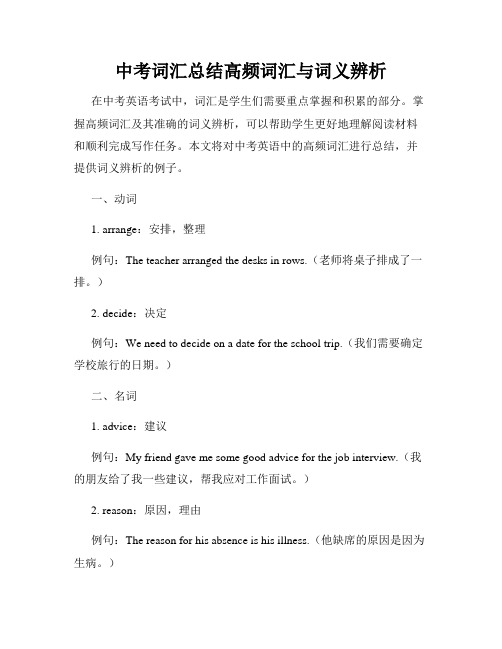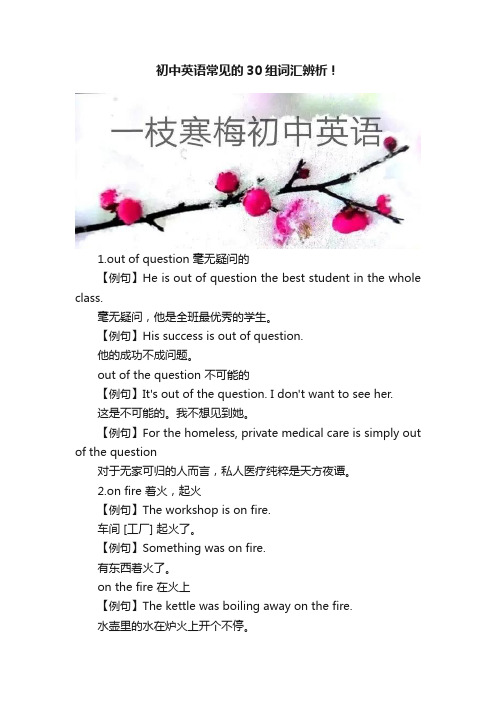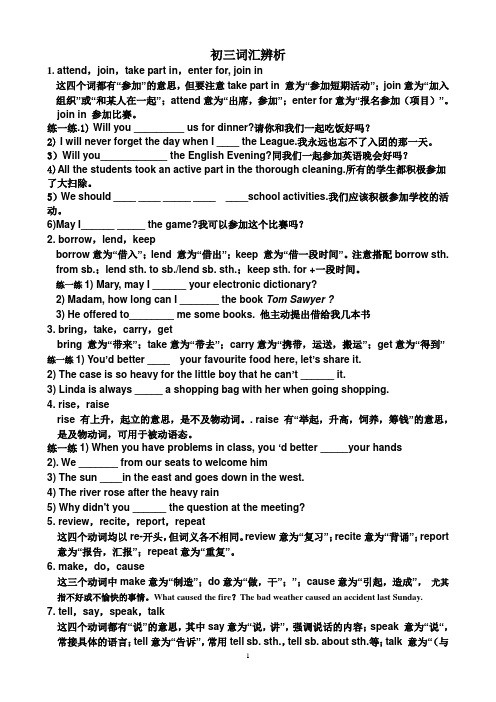初中英语词汇词组辨析
初中英语词汇词组辨析

56.quite ,very 很,十分1quite a +形容词+名词“一个相当……的……”quite a clever boy 一个相当聪明的男孩2a very+形容词+名词“一个非常……的”a very clever boy 一个非常聪明的男孩57.say,speak,talk,tell 说1say 后接说的内容,He says he likes English very much.2speak 后接语言,I can speak Japanese3talk “讨论,谈论”,可作动词也可作名词,talk about sth 谈论某件事,talk with /to sb 和某人谈话4tell ,“告诉,讲述”tell sb sth 告诉某人某件事,tell a story ,tell a lie 撒谎58.since, for 用于完成时态1since 后接时间点. Lucy has lived there since 1955. Lucy 自从1955年以来一直住在这里。
接“时间段+ago”I have been teaching since 10 years ago. 我教英语有10年了接“一般过去时态的句子”We have known each other since we were young.我们从小就认识。
2for 后接时间段。
We have studied for 9 years.我们学英语已经9年了。
59. so , such,如此,这样。
So /such ……that+否定句子=too……to+动词原形;so/such…+肯定句子=enough to+动词原形1so,修饰形容词或many,much,little,few(so good a boy 如此好的一个男孩(so much difficult 太多的困难He is so young that he can’t go to school=He is too young to go to school.他太小了,不能去上学。
中考词汇总结高频词汇与词义辨析

中考词汇总结高频词汇与词义辨析在中考英语考试中,词汇是学生们需要重点掌握和积累的部分。
掌握高频词汇及其准确的词义辨析,可以帮助学生更好地理解阅读材料和顺利完成写作任务。
本文将对中考英语中的高频词汇进行总结,并提供词义辨析的例子。
一、动词1. arrange:安排,整理例句:The teacher arranged the desks in rows.(老师将桌子排成了一排。
)2. decide:决定例句:We need to decide on a date for the school trip.(我们需要确定学校旅行的日期。
)二、名词1. advice:建议例句:My friend gave me some good advice for the job interview.(我的朋友给了我一些建议,帮我应对工作面试。
)2. reason:原因,理由例句:The reason for his absence is his illness.(他缺席的原因是因为生病。
)三、形容词1. polite:有礼貌的例句:Emily is always polite to her elders.(艾米莉对长辈总是非常有礼貌。
)2. honest:诚实的例句:He is an honest person and never tells lies.(他是一个诚实的人,从不说谎。
)四、副词1. quickly:快速地例句:She finished the race quickly and won the first place.(她迅速完成了比赛并获得了第一名。
)2. quietly:安静地例句:Please read quietly in the library.(请在图书馆安静地阅读。
)词义辨析:1. forget与remember虽然forget和remember都有“记住”的意思,但用法上有所不同。
forget表示“忘记”,后接名词或动名词,而remember表示“记得”,后接名词、动名词、动词-ing形式或从句。
初中英语重点短语辨析

初中英语重点短语辨析1. be made of / be made fromⅠ. be made of “由……制成/造”成品看得出原料。
如:The desk is made of wood. 这张桌子是木头制成的。
Ⅱ. be made from “由……制造/成”成品看不出原料。
如;Paper is made from rags.纸是由破布做的。
(已看不出原料)2. be pleased with/ at/ toⅠ. be pleased with “对……人/物,感到满意”介词with后接人或物。
如:① Both Mark and her mother were pleased with the girl. 马克和他妈妈都有喜欢这个女孩。
② I wasn’t very pleased with / at my exam results. 我对自己的考试成绩不太满意。
Ⅱ. be pleased at “对……某事/物,感到满意”。
介词at 常与事物搭配使用。
He was very pleased at the news.他对这个消息感到很满意。
Ⅲ. be pleased to “乐意……;因……而高兴”。
to 不是介词,而是小品词。
后接动词原形。
如:① I shall be pleased to go. 我将乐意去。
② We are quite pleased to be working in this country. 能在这个国家工作,我们是十分高兴的。
3. be sure of/ be sure to do/ be sure thatⅠ.be sure of “确信对……有把握”后接名词、代词或动词-ing 形式,表对客观事物有肯定的认识和判断,主语必须是人。
如:① As David joined our team, we are sure of winning the game this time.由于David参加了我们的球队,我们这次有把握取胜。
初中英语常见的30组词汇辨析!

初中英语常见的30组词汇辨析!1.out of question 毫无疑问的【例句】He is out of question the best student in the whole class.毫无疑问,他是全班最优秀的学生。
【例句】His success is out of question.他的成功不成问题。
out of the question 不可能的【例句】It's out of the question. I don't want to see her.这是不可能的。
我不想见到她。
【例句】For the homeless, private medical care is simply out of the question对于无家可归的人而言,私人医疗纯粹是天方夜谭。
2.on fire 着火,起火【例句】The workshop is on fire.车间 [工厂] 起火了。
【例句】Something was on fire.有东西着火了。
on the fire 在火上【例句】The kettle was boiling away on the fire.水壶里的水在炉火上开个不停。
【例句】Put another lump of coal on the fire.往炉火上再加放一块煤。
3.in office 在职的,执政的【例句】He had nothing tangible to show off three years in office.他为官三年,无实绩可言。
【例句】Which political party is in office in your country ?贵国是哪一个政党执政?in the office 在办公室里【例句】He was wanted in the office.有人在办公室找他。
【例句】Would you introduce me to others in the office?你能把我介绍给办公室的其他人吗?4.the doctor and teacher 指一个人,既是医生又是老师。
初中英语300组常用词语辨析完整版

初中英语300组常用词语辨析Lesson495.bloom/flower/blossomⅠ.bloom指观赏用的花。
如:玫瑰;菊花;牡丹等。
Ⅱ.flower是普通用语。
Ⅲ.blossom指果树上的花。
96.boat/shipⅠ.boat“船、艇,”是普通用语。
主要指用浆、篙、帆或引擎的小船、小艇,但有时也指大轮船。
如:1We crossed the river by boat.我们乘船过河。
2They pulled the boat up on to the shore.他们把这条船拖上了岸。
(指小船③When does the boat leave for Shanghai?(指轮船Ⅱ.ship“船、舰,”多指大的航海船只。
如:1The ship is at sea.船厂在航海。
2They went to Guangahou by ship.他们乘船去广州。
97.bold/brave/courageousⅠ.bold“大胆的、勇敢的”着重指大胆、勇敢的气质,表现出有胆量、敢闯或敢于对抗而不畏缩。
如:1Be bold!勇敢些!2It’s very bold of us to v enture to go to sea.我们冒险航海是很勇敢的。
Ⅱ.brave“勇敢的”,应用最广泛,通常指在危险、困难或可怕的情况下表现勇猛而畏缩。
如:1Be brave!勇敢些!2It was brave of him to enter the burning building.他敢进入那燃烧着的房屋,真是勇敢。
Ⅲ.courageous“勇敢的,无畏的”表示由于有勇敢的气质或不屈不挠的精神而能无畏地自觉地对付某种事情,常常用于表示道义上的勇敢。
如:1He is courageous in telling the truth.他敢于讲实话。
2We hope that they will courageously shoulder their responsibilities and overcome all difficulties.我们希望能够勇敢地负起责任,克服一切困难。
初中英语常用词语辨析大全 .

初中英语常用词语辨析A.............................................................1.at the moment\in a moment\for a moment\at the moment=right now"此时此刻",用于现在时。
in a moment = very soon “很快,立即”,一般用于将来时的句子。
for a moment “此刻,一会儿”表示时间的延续。
[例] He is out at the moment.此刻他不在家。
I will come back in a moment.我一会儿就回来。
Hold on for a moment.请稍候。
............................................................. 2.a few/ few(1)a few, few 用来修饰可数名词。
(2)a few “有一些”,表示肯定概念,few 几乎没有,表示否定意义。
[例] The man has been here for many years, so he has a few friends. 这个人在这里住了很多年了,他有一些朋友。
I am a new comer here, so I have few friends here.我刚来到这里,所以我在这里没有几个朋友。
............................................................. 3.a little/ little(1) a little, little 用于修饰不可数名词。
(2) a little “有一些”,表示肯定概念。
little “几乎没有”,表示否定概念。
[例] There is a little water in the glass.杯子里有一些水。
词汇辨析+词组辨析

初三词汇辨析1. attend,join,take part in,enter for, join in这四个词都有“参加”的意思,但要注意take part in 意为“参加短期活动”;join意为“加入组织”或“和某人在一起”;attend意为“出席,参加”;enter for意为“报名参加(项目)”。
join in 参加比赛。
练一练.1) Will you _________ us for dinner?请你和我们一起吃饭好吗?2) I will never forget the day when I ____ the League.我永远也忘不了入团的那一天。
3)Will you____________ the English Evening?同我们一起参加英语晚会好吗?4)All the students took an active part in the thorough cleaning.所有的学生都积极参加了大扫除。
5)We should ____ ____ _____ ________school activities.我们应该积极参加学校的活动。
6)May I______ _____ the game?我可以参加这个比赛吗?2. borrow,lend,keepborrow意为“借入”;lend 意为“借出”;keep 意为“借一段时间”。
注意搭配borrow sth. from sb.;lend sth. to sb./lend sb. sth.;keep sth. for +一段时间。
练一练1) Mary, may I ______ your electronic dictionary?2) Madam, how long can I _______ the book Tom Sawyer ?3) He offered to________ me some books. 他主动提出借给我几本书3. bring,take,carry,getbring 意为“带来”;take意为“带去”;carry意为“携带,运送,搬运”;get意为“得到”练一练1) You‟d better ____ your favourite food here, let‟s share it.2) The case is so heavy for the little boy that he can‟t ______ it.3) Linda is always _____ a shopping bag with her when going shopping.4. rise,raiserise 有上升,起立的意思,是不及物动词。
中考英语近义词汇及词组辨析

中考英语近义词汇及词组辨析中考英语考试中,近义词汇及词组的辨析是一个很重要的考点。
同学们在备考过程中应该特别注意掌握这些词汇及词组的区别和用法。
本文将为大家介绍一些常见的近义词汇及词组,帮助同学们更好地应对中考英语。
一、accurate与correctaccurate和correct都表示“准确的”。
它们的区别在于:accurate强调准确度的高,而correct则更多地强调符合规范、正确的。
例如:1. The scientist made accurate measurements. (科学家做出了准确的测量。
)2. Please correct your mistakes in the essay. (请在作文中纠正你的错误。
)二、advice与adviseadvice是名词,意为“建议”或“忠告”,而advise是动词,意为“建议”或“提供意见”。
例如:1. Can you give me some advice on how to learn English? (你能给我一些建议如何学习英语吗?)2. I advise you not to be late for the meeting. (我建议你们不要迟到会议。
)三、borrow与lendborrow和lend都与“借”的概念有关,但使用上有所不同。
borrow表示“借入”,lend表示“借出”。
例如:1. Can I borrow your pen? (我能借用你的钢笔吗?)2. Could you lend me some money? (你能借给我一些钱吗?)四、famous与popularfamous和popular都表示“著名的”,但有所不同。
famous更多地指代某个人或事物在广泛的范围内被人所熟知,而popular则更多地指代某个人或事物在大众之间受欢迎。
例如:1. Mozart is a famous composer. (莫扎特是一个著名的作曲家。
- 1、下载文档前请自行甄别文档内容的完整性,平台不提供额外的编辑、内容补充、找答案等附加服务。
- 2、"仅部分预览"的文档,不可在线预览部分如存在完整性等问题,可反馈申请退款(可完整预览的文档不适用该条件!)。
- 3、如文档侵犯您的权益,请联系客服反馈,我们会尽快为您处理(人工客服工作时间:9:00-18:30)。
56.quite ,very 很,十分
1)quite a +形容词+名词“一个相当……的……”quite a clever boy 一个相当聪明的男孩2)a very+形容词+名词“一个非常……的”a very clever boy 一个非常聪明的男孩
57.say,speak,talk,tell 说
1)say 后接说的内容,He says he likes English very much.
2)speak 后接语言,I can speak Japanese
3)talk “讨论,谈论”,可作动词也可作名词,talk about sth 谈论某件事,talk with /to sb 和某人谈话
4)tell ,“告诉,讲述”tell sb sth 告诉某人某件事,tell a story ,tell a lie 撒谎
58.since, for 用于完成时态
1)since 后接时间点. Lucy has lived there since 1955. Lucy 自从1955年以来一直住在这里。
接“时间段+ago”I have been teaching since 10 years ago. 我教英语有10年了
接“一般过去时态的句子”We have known each other since we were young.我们从小就认识。
2)for 后接时间段。
We have studied for 9 years.我们学英语已经9年了。
59. so , such,如此,这样。
So /such ……that+否定句子=too……to+动词原形;so/such…+肯定句子=enough to+动词原形
1)so,修饰形容词或many,much,little,few
(so good a boy 如此好的一个男孩)(so much difficult 太多的困难)
He is so young that he can’t go to school=He is too young to go to school.他太小了,不能去上学。
He is so tall that he can reach it=He is tall enough to reach it
2)such ,修饰名词。
She is such a careful girl.她是一个如此细心的女孩。
60. sometimes有时,sometime(过去或将来)的某个时候,
some times几次,几倍,some time一段时间
61.surprise, surprised , surprising; 奇异
1)surprise 动词,“使惊奇,使诧异”常搭配:in surprise “惊奇地,惊讶地”修饰动词He looked at me in surprise.他惊讶的看着我。
To one’s surprise“使某人感到惊奇的是”
2)surprised 形容词,“感到惊奇的”修饰人。
Be surprised at 对……感兴趣
3)surprising 形容词,“令人惊奇的”形容物
63. till ,until 到……的时候为止
1)till“到……时候为止”意为动作一直持续到……结束,肯定句中的谓语必须是延续性动词。
I worked till late night. 我一直公共到深夜。
2)not…until“直到……才……”否定句中的谓语必须是终止性动词。
She didn't get up until her mother came in. 直到妈妈进来她才起床。
注意:till 和until 通常情况下可以互换,只是在句首时until 比till 更常用。
64. because ,because of
1)because +句子。
He was late because it rained heavily.
2) because of +名词,代词或名词词组。
He was late because of the heavy rain.
65. unless,if 都用于条件状语从句
1)unless 是“除非,如果不”,相当于=if not
2)if 是“如果,假如”的意思。
If you don’t study hard ,you will fall behind.
=You will fall behind unless you study hard.如果你不努力学习,你就会落后的。
注意:if 还可以用于宾从,是“是否”的意思
I want to know if he will come here tomorrow.我想知道明天他是否会来这里。
65.when while “当……时候”
1)when 引导的从句谓语动词可以是延续性,也可以是短暂性的
We were talking when the teacher came in. 老师进来的时候我们正在讲话。
I was walking on the stress when it began to rain.我在街上散步的时候,突然下雨了。
2)while 引导的从句谓语动词必须是持续性的
I was reading while my brother was playing computer弟弟在玩电脑的时候我在看书。
While 还可以表示转折,“然而”。
I like pop music ,while my brother likes classic music.
67. whole , all 整个,所有,全部
1)冠词+whole +名词。
The whole family 整个家庭
2)all+冠词+名词all the students 全部的学生。
68. a number of ,the number of
1)a number of =many 非常多,大量的(后接可数名词)
There are a number of students in our school. 我们学校有很多学生。
1)the number of ……的数量(做主语时,谓语动词只能用单数)
The number of the students in our school is 5000.我校学生的人数是5000
69. at the end of ,by the end of ,in the end 。
1)at the end of ……在……之末(后接时间或地点)
2)by the end of ……到……末未止(后接时间,如果是过去的时间,用于过去完成时)We had learned about 3000 words by the end of last term.到上个学期末未止,我们已经学习了大约3000个单词。
3)in the end =at last =finally最后,终于
70.Be famous for ,be famous as
1)be famous for 以……而著名。
China is famous for the Great Wall.
2) be famous as 作为……而有名Li Yuhun is famous as a singer.李宇春作为一名歌手而有名。
71.be made of, be made from , be made in be made by
1)be made of 由…制成(看得出原材料)The bed is made of wood.
2)be made from 由……制成(看不出原材料)The wine is made from rice.
3) be made in 在……制成
4)be made by 是谁……制作的
72.be ill in bed,on the bed
1)be in bed 卧病在床(睡在床上)2)on the bed在床上(不一定在睡觉)
73.in front ,in front of ,in the front of
1)in front在前面He is in front.他在前面
2)in front of 在……前面(范围之外)
There are three trees in front of our classroom. 在我们教师前面有三棵树(教师外面)
2)in the front of 在……前部(范围之内)
There is a computer in the front of our classroom.在我们教师前面有一台电脑(教师里面)74.go to bed, go to sleep , fall sleep
1)go to bed 上床,上床睡觉(强调上床的动作)
I usually go to bed at 10:00我经常十点上床睡觉
2)go to sleep 入睡,睡着(强调从醒到睡着的过程)
What time do the kids usually for to sleep?孩子们经常九点睡着?
3)fall sleep 入睡,(强调睡着了的状态)
He fell asleep sitting in his chair. 我坐在椅子上睡着了。
75.too much ,much too
1)too much 太多,接不可数名词
2)much too 太,接形容词或副词。
